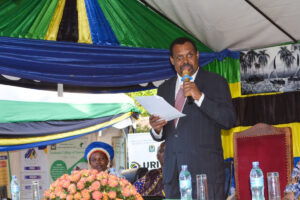By Godwin Jaha Semunyu
As The Citizen celebrates its 20th anniversary, it is more than just a milestone—it is a testament to the enduring legacy of a publication that has continually shaped the narrative of Tanzania’s development.
Over the past two decades, The Citizen has not merely been a newspaper; it has been a steadfast pillar in the media industry, championing journalistic excellence, integrity and proffessionalism.
In today’s fast-paced digital world, where social media often dominates the dissemination of information with its immediacy, The Citizen has stood tall.
It has navigated through the turbulent waters of changing market dynamics and external pressures, all while staying true to its core mission: delivering reliable, in-depth, and impactful news that resonates with the lives of Tanzanians.
Reflecting on my personal journey with The Citizen, I find myself deeply connected to its mission.
Every morning, without fail, I turn to its pages. Sometimes staying up until 11 PM to get my online copy before the next morning. Savoring the depth and professionalism that define its reporting.
In an age where social media often prioritises speed over substance, The Citizen provides the context, analysis, and thoroughness that only seasoned journalism can offer.
This habit has become more than a routine—it’s a commitment to providing news as trusted source that values accuracy and depth that sets them apart.
Throughout my career in the PR and Mareketing of banking sector, I have had the privilege of working closely with the talented team at The Citizen.
One memory that stands out vividly is from June 2016. At the time, I was serving as the PR Manager for my previous employer, and we were launching our first subsidiary in Bujumbura, Burundi.
It was a significant event, and I was determined to share our success with the world. However, we faced severe internet challenges in Bujumbura that day.
Despite these obstacles, I managed to send out the press release in bits and pieces via SMS to my correspondences. My hope was slim, but to my astonishment, The Citizen not only received my fragmented messages but also featured our story prominently on the front page the next day.
It was a proud moment, immortalized by the headline I had suggested: “Proud Moment as Tanzanian Bank Opens Doors in Burundi.”
This experience epitomizes the dedication and partnership that The Citizen brings to every story it covers. It is this commitment to journalistic integrity that has enabled The Citizen to remain relevant in an era where news consumption has drastically shifted.
While the rise of social media has introduced new challenges—where speed often compromises accuracy—The Citizen has maintained its commitment to delivering well-researched, balanced reporting that goes beyond the surface.
Moreover, The Citizen has consistently upheld its editorial independence, navigating the complex landscape where external influences often threaten to overshadow journalistic freedom.
Its steadfast dedication to presenting unbiased, comprehensive reporting has earned it the respect and trust of readers from all sectors of society.
I commend the expertise and precision with which The Citizen covers business news, a service that has become indispensable to many investors and stakeholders across the nation.
As a dedicated follower, I have particularly appreciated The Citizen’s insightful coverage of the banking sector, where their quarterly, half-year, and annual analyses are not only thorough but also enriched with balanced perspectives from industry players.
This level of detailed scrutiny plays a crucial role in driving the performance of banks, ultimately benefiting customers and contributing to the overall economic stability of our industry.
Moreover, The Citizen has consistently demonstrated its commitment to thought leadership, particularly through its impactful forums.
By partnering with key stakeholders, they have successfully provided a platform for disseminating vital information across various sectors, including agriculture, investement, mining, Finance, and climate action, to name a few.
These forums have gone beyond mere reporting—they have fostered awareness, stimulated value chains, and driven positive change.
Indeed, The Citizen, alongside its sister publication Mwananchi, has proven to be much more than a source of news. Through their leadership in thought forums and in-depth industry analyses, they have positioned themselves as a driving force for informed discourse and sectoral advancement.
Their contributions have not only empowered the industries with relevant information, but have also empowered masses to make informed investment decisions.
As The Citizen celebrates two decades of excellence, it is clear that its journey is far from over. The challenges of the future are inevitable, but so is the newspaper’s commitment to the highest standards of journalism.
In a rapidly evolving world, The Citizen continues to be a trusted source of news and an integral part of Tanzania’s media fabric.
Here’s to 20 years of The Citizen—20 years of telling our nation’s stories, helping investment decisions, voice for the voiceless and contributing to the social and economic development of Mama Tanzania.
May the next 20 years be just as impactful, continuing to uphold the values that have made The Citizen a beacon of journalistic integrity in Tanzania. Hongereni sana.
Godwin Jaha Semunyu Is the Head of Corporate Affairs ant NBC Bank and an adent reader of The Citizen. These are his personal views















